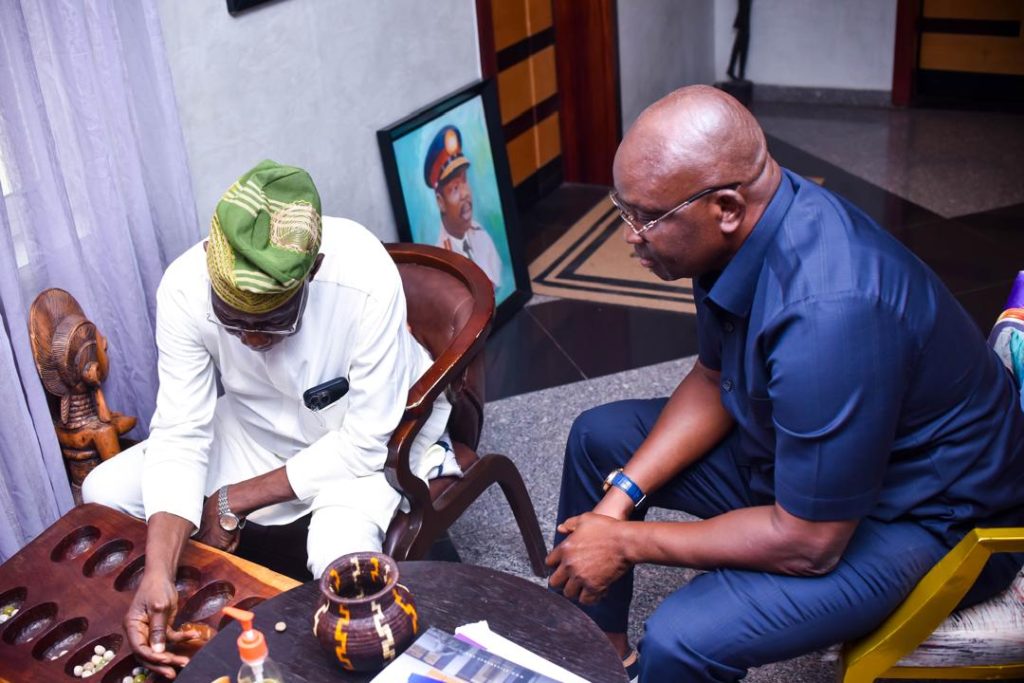A new chapter has opened in the long-running feud between former President Olusegun Obasanjo and former Ekiti State Governor Ayodele Fayose, following the release of a scathing text message Fayose sent after Obasanjo attended his 65th birthday celebration in Lagos last week.
The message described as an “insulting and abusive ‘Thank You’ note”—was made public on Monday by Obasanjo’s Special Assistant on Media, Kehinde Akinyemi, in Abeokuta.
In the text, Fayose thanked the 89-year-old former president for honouring his invitation but criticised what he called Obasanjo’s “irresponsible comments” at the event.
Read Also: Ayo Fayose brother chides ex-governor in birthday wish message
According to Fayose, “Dear Baba Obasanjo, I trust this meets you well. Your coming to my birthday party, I appreciate it, except for your very irresponsible comments at your age. You went so low, but I am not surprised because someone once said you are supposed to be kept away in the zoo. Sincerely, that’s where you belong.”
He added that he kept silent at the event to show “the difference between a sane man and a mad man,” while alleging that Obasanjo’s conduct reflected “the heightened stage of dementia.”
Fayose further demanded that the former president return the money he claimed to have sent to facilitate Obasanjo’s attendance at the ceremony, insisting, “Lastly, I shall appreciate it if you return my money since you publicly admitted you received it, but Dangote brought it back. Your leopard will never change its skin.”
In a sharp response, Obasanjo described Fayose’s message as an exposure of his true nature. “Ayo, thanks for your ‘Thank You’ message, which undisguisedly revealed who and what you are, unchanged and unchangeable,” Obasanjo was quoted as saying. He added that the money in question had already been returned “through Foluso Adeagbo, who brought it, in the same bag as he delivered it, unopened by me.”
Obasanjo, who was the special guest of honour at the birthday celebration, used the occasion to recount years of animosity between both men. He told guests that Fayose had consistently abused him during and after his tenure as governor, often without remorse.
He noted that Fayose did not initially invite him directly to the event, instead sending former Minister Osita Chidoka to “sound him out” before making personal contact. According to Obasanjo, even after agreeing to meet, Fayose delayed, sending an associate ahead to gauge the former president’s disposition before arriving an hour later.
“When you came, you called your wife, and while on the phone, I said that both of you have not conducted yourselves well—Mo ni eyin mejeji kii somoluwabi,” Obasanjo said, recalling their meeting. He added that Fayose’s wife asked for forgiveness and that both were forgiven.
However, Obasanjo stressed that Fayose must learn from the past, recounting his earlier warnings to the former governor about investing government funds in a controversial poultry project during his administration—an initiative he described as fraudulent and ultimately doomed to fail.
His comments at the birthday ceremony also included a call for Fayose to seek “genuine repentance and forgiveness” from those he may have wronged.
The latest exchange adds to nearly two decades of public hostility between the two political figures, whose relationship deteriorated during Fayose’s first tenure as governor from 2003 to 2006.
At the time, Obasanjo, as president and leader of the Peoples Democratic Party (PDP), was a dominant force in national politics. Fayose, also a PDP governor, often resisted pressures to align fully with the presidency, leading to early friction.
The conflict reached a major turning point in 2006 when Fayose was impeached over allegations of corruption and mismanagement, a development he insisted was engineered by Obasanjo’s camp. Obasanjo’s allies countered that the impeachment was a legitimate response to wrongdoing.
Over the years, their feud has intensified through mutual accusations of corruption, political interference, arrogance, and hypocrisy. Fayose has repeatedly alleged that Obasanjo meddled in Ekiti politics and sought to control state governors, while Obasanjo has often dismissed Fayose as undisciplined or unserious.
The hostility resurfaced prominently during the Goodluck Jonathan presidency (2014–2015) and continued into subsequent administrations.
With the latest publicly exchanged insults, the Fayose–Obasanjo feud shows no sign of abating. Their clash rooted in personal grievances, political rivalries, and clashing temperaments—remains one of Nigeria’s most enduring political dramas, offering yet another reminder of the deep divisions within the country’s political class.



